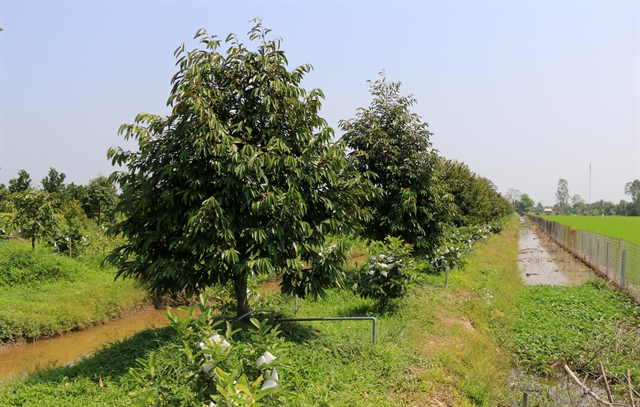 Economy
Economy

 |
| A 28-month durian garden in Đồng Tháp Province. Many farmers switched to planting durian after this type of fruit was exported officially to China. — VNA/VNS Photo Nhựt An |
HÀ NỘI — Fruit farming must follow planning to prevent prices from falling due to oversupply, according to the Ministry of Agriculture and Rural Development.
Recently, many farms in the southern province of Trà Vinh Province reported losses because the prices of many kinds of fruits such as mango, orange and pomelo continued to drop.
Nguyễn Văn Thức, a farmer in Hoà Tân Commune, Cầu Kè District, said that his 0.2-hectare farm of Cát Chu mango was entering a harvest season, but the price of mango was falling to VNĐ13,000 per kg (US$0.55), VNĐ5,000 lower than the end of April.
He said that with such a low price, farmers suffered a loss of around VNĐ30 million for 1-ha mango farm.
Farms of orange and green-skin pomelo also suffered losses from VNĐ50 million to VNĐ70 million per hectare, with the price of orange falling from VNĐ15,000 per kg to VNĐ5,000, and pomelo from VNĐ25,000 to VNĐ15-18,000.
According to Nguyễn Như Cường, Director of the ministry’s Department of Crop Production, many types of fruits were planted spontaneously in recent years as farmers did not follow planning but raced for short-term profit, bringing several consequences.
The increase in fruit plantation area and output resulted in oversupply and made it difficult for consumers, Cường said. As a result, the prices of many fruits plummeted.
In 2018, the department asked localities to maintain the orange plantation area at around 84,000 ha as planned, but now the orange plantation area has been expanded to 97,000 ha.
The plantation area of durian was increasing rapidly without proper control, especially after the Ministry of Agriculture and Rural Department signed a protocol with China on the official export of durian to this market.
Cường cited statistics that the durian plantation area increased from 17,6000 ha with a total output of 107,600 tonnes per year to 90,000 ha with an output of 1.3 million tonnes yearly.
In Hà Nội, for example, the plantation area of citrus, mostly pomelo and orange, increased by five times from 2,000 ha with an output of 10,000 tonnes in 2007-08 to 10,000 ha with an output of 100,000 tonnes in 2021-22.
Lê Xuân Trường, Deputy Director of the municipal Department of Cultivation and Plant Protection, said that the increases in plantation areas and output of citrus made it difficult for farmers.
Cao Văn Mai, a farmer in Vân Hà Commune, Phúc Thọ District, Hà Nội, said that 10 years ago, the price of diễn pomelo was at around VNĐ30-40,000 but due to the increase in plantation, the price fell to VNĐ10,000.
The Ministry of Agriculture and Rural Department’s statistics showed that prices of some fruits continued to drop in April compared to March, such as Hoà Lộc mango from VNĐ51,000 per kg to VNĐ22,700, Cát Chu mango from VNĐ24,700 to VNĐ8,100.
The price of durian started to cool down as the main harvest season was coming. Currently, Ri6 durian is priced at VNĐ97,500 per kg, down by VNĐ4,200 from last month.
“The massive increase in the plantation area of fruits causes oversupply and price decreases. Moreover, when fruit trees are grown in unsuitable areas, their quality and productivity will be affected,” Cường said.
Coping with the uncontrolled massive expansion of fruit plantations, the Minister of Agriculture and Rural Development approved a project on the development of major fruit trees by 2025 with a vision to 2030. Key fruits include 14 types, such as dragon fruit, mango, banana, lychee, longan, orange, pomelo, durian and jackfruit.
Nguyễn Thành Công, Deputy Chairman of the Sơn La Province People’s Committee, said that the focus should be placed on developing plantation areas with high quality and meeting requirements for exports.
In addition, it was necessary to create favourable conditions to attract investments in processing in line with the development of plantation areas.
According to Cường, instead of increasing plantation areas, farmers and enterprises should focus on building brands, increasing added value and standardizing production from cultivation to harvest, processing and distribution to establish a value chain in fruit production.
Minister of Agriculture and Rural Development Lê Minh Hoan said that it was necessary to gradually change the thinking of farmers to switch to sustainable agriculture.
He said that communication campaigns must be enhanced to encourage farmers to produce following planning, together with providing support to build brands for fruits and increase quality to meet export requirements. In addition, trade promotions must be stepped up to expand markets.
Việt Nam has targeted to earn US$4 billion from vegetables and fruits export this year, from $3.1 billion in 2022. Vegetables and fruits export reached nearly $1 billion in the first quarter. — VNS